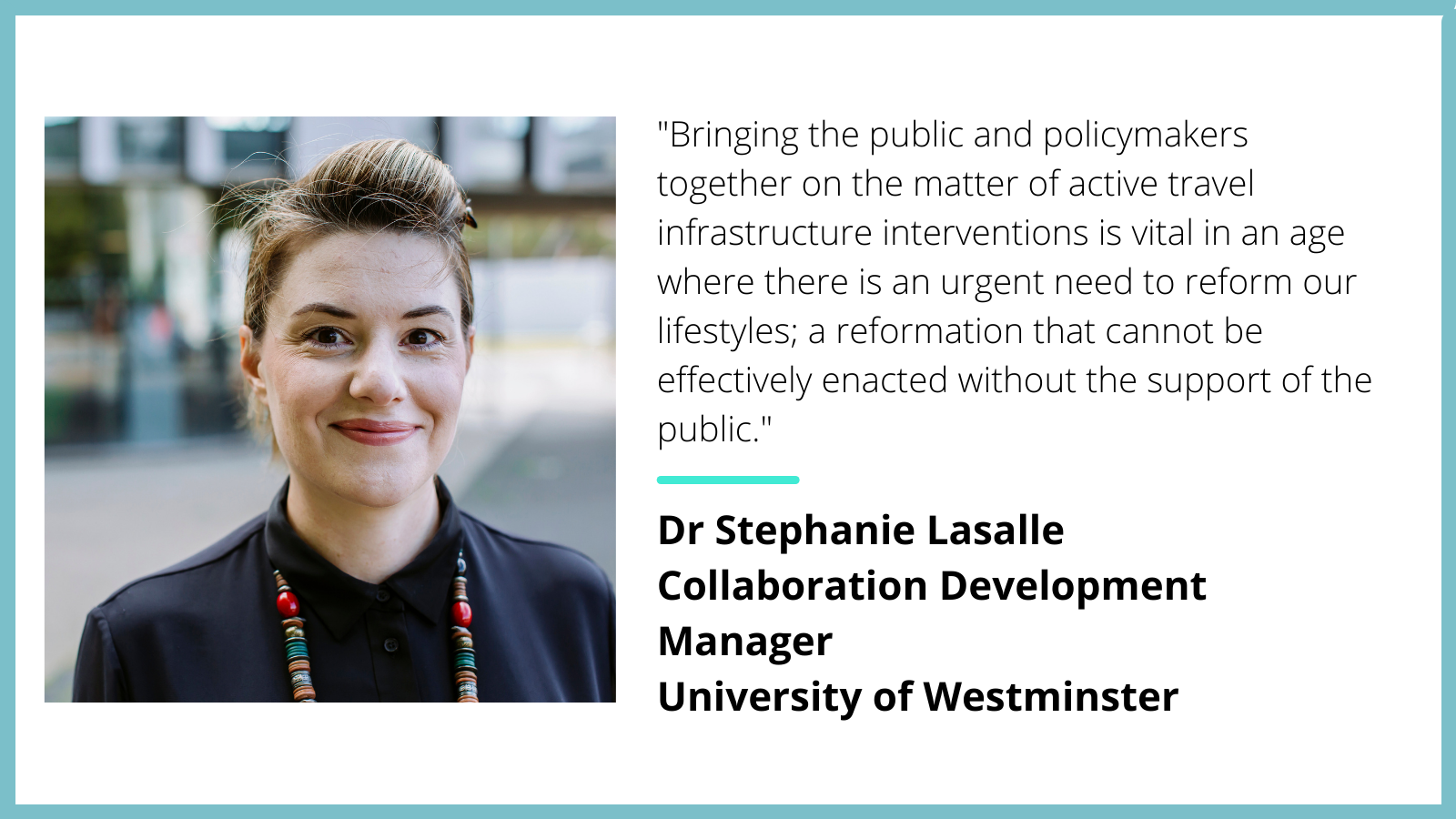Engaging the public on active travel policymaking
Posted 2022-04-26 12:55:39 by Stephanie Lasalle and Jeeshan Gazi

Bringing the public and policymakers together on the matter of active travel
infrastructure interventions is vital in an age where there is an urgent need to reform our lifestyles; a reformation that cannot be effectively enacted without the support of the public.
Academics at the University of Westminster are at the vanguard of research into active travel, which encompasses walking, cycling, and the use of other ‘micro-mobilities’ from e-scooters to electric hand cycles.
Professor Rachel Aldred, the Director of the Active Travel Academy, has translated her research into experiences of cycling and of active travel policy-making for partners such as Transport for London and the former Deputy Mayor for Transport in London. This work led to changes in the guidance documents provided to infrastructure planners. This updated guidance made planners recognise the need to ensure road infrastructure is both safe and welcoming to cyclists, helping to encourage more of the public to adopt this mode of clean, sustainable, transport.
During the COVID-19 pandemic, the government released Ł250m to councils across the country to implement interventions, such as emergency low-traffic neighbourhoods, intended to boost active travel. Down south in sunny Portsmouth, where I live, a section of road bordering the seafront promenade was closed to all motor vehicles for several months. Being someone who walked there every day, I very much enjoyed that sudden change, as did the families with young children and all the active walkers, runners and rollerbladers. This section of road had become an oasis of safety and attracted many new visitors who sought to make the best out of the seafront during those heavy COVID ridden days.
As in Portsmouth, however, there were instances of backlash from some citizens living in these areas of intervention; particularly those who drive along such roads. The emergency interventions have even resulted in attempted legal action on behalf of some residents.
What is evident is that at a point when we all need to drastically change our way of life to respond to the climate crisis, culture change is necessary on the part of both the public and policymakers.
Research led by Professor Aldred has helped to dispel some of the myths around the (in)effectiveness of low-traffic neighbourhoods, highlighting reductions in injuries for pedestrians, car users, and cyclists. The research has also shown that, in London, these schemes have been more likely to be implemented in poorer communities. The findings have provided policymakers with an evidence base that provisionally supports the expansion of such interventions and, through their dissemination via major news outlets, will have helped to change the perception of some road users regarding active travel. A major study funded by the National Institute for Health Research, led by Professor Aldred, is now building on this evidence base and exploring additional questions such as impacts on disabled people and air pollution.
The University of Westminster is using Research England’s Participatory Research and Policy Support Funds to work towards avoiding future conflict between local authorities and citizens by facilitating their greater input into the vital policy changes that are required to meet the climate challenges we all face.
One project is led by Dr Enrica Papa and aims to advance mobility justice through intensive co-production, meaning she is doing research with people instead of for them or on them. It focusses on two ‘street experiments’, defined as ‘intentional, temporary changes in street use, regulation and/or form, aimed at exploring systemic change towards a post-car city’. Drawing on partners from her larger EX-TRA research project, Dr Papa and Dr Emilia Smeds are bringing together communities from Redbridge and Lambeth that are typically underrepresented in local planning debates, local civil society groups and the respective local councils, to capture people’s narratives of lived experiences in public space and to provide recommendations for the Borough Councils as they develop their active travel policymaking.
Another project, led by Dr Dan Greenwood, focusses on the effectiveness of London governance in coordinating policy delivery for ambitious net zero targets in the context of the climate emergency, with a particular focus on how policy for increasing active travel is balanced with other socio- economic policy goals. Using a specific West London development project as its case study, Dr Greenwood is bringing together a range of stakeholders in order to identify opportunities and challenges for, as well as public perceptions and responses to, active travel policy and planning at this early stage of development. These partners and collaborators include representatives of the development, local authority officers, local councillors, Transport for London, cycle campaign groups, and other local campaign groups.
The hope at University of Westminster is that research projects like these will help to shift the
relationship between policymakers and communities on the matter of active travel. This
development of new methods for effective policymaking should in turn enable greater investment in green policy by the citizens living in the areas of intervention.
Stephanie Lasalle – Collaboration Development Manager, University of Westminster
Dr Stephanie Lasalle manages the Collaboration Development Team within the Research and Knowledge Exchange Office at the University of Westminster. Stephanie and her colleagues are encouraging academics to collaborate across-disciplines, as well as work with HE and non-HE external partners, across London and the UK, the EU and globally too.
Jeeshan Gazi – Research Impact Officer, University of Westminster
Dr Jeeshan Gazi works across disciplines to encourage, develop, support, and evidence research impact on external communities and partners.










































































































